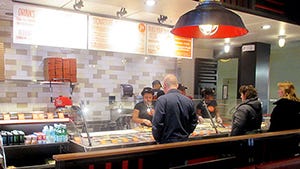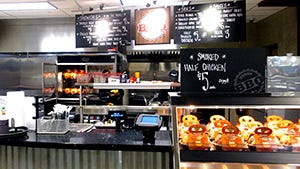Why supermarkets should worry about the rise of fast casualWhy supermarkets should worry about the rise of fast casual
There are several underlying trends that suggest that fast casual will have a long-term impact on the industry.
The headlines in the foodservice arena of late are interesting and thought-provoking. McDonald’s replaces its CEO as the brand struggles on a global basis to connect to the new generation of customers while upstart Shake Shack has a monster IPO debut.

Blaze Pizza lets customers customize their pizzas.
All around us, “fast casual” restaurants, the industry term for food the quality of casual dining served at the speed of fast food, are sprouting and thriving. We call it the “Chipotle-zation” of foodservice as various food offers attempt to mimic the wildly successful Chipotle, where customers can easily customize their own fresh offer in front of them. We have seen make-it-your-own now extend to pizza, where easily a dozen chains are vying for quick customization and have seen it move into ethnic cuisine, where there are fast casual versions of Asian, Mediterranean, Indian and Italian popping up everywhere. This is not to mention some fast casual takes on old favorites like BBQ, salads and, of course, the burger.
There are several underlying trends that suggest that fast casual will have a long-term impact on the industry:
• Millennials seem to be a driving force behind expanded food options. They are increasingly diverse ethnically, adventuresome in their eating habits and want to seek out new experiences.
• There is a powerful trend towards customization and control. Customers enjoy making it their own through easy customization.
• There is also a shift towards what is perceived as healthier foods and more concern about product origins and provenance.
This challenges McDonald’s core model and plays well for the emerging fast casual competitors who can charge more for these perceived benefits.

Newer Mariano's stores have a fast casual style restaurant called Todds BBQ.
It can also play well for supermarkets but poses the same kinds of challenges. How updated is your offer and does it reflect the changing food trends? The newer Mariano’s stores offer up an authentic BBQ experience called Todds while Market Bistro from Price Chopper has multiple customizable components.
This is a great opportunity for supermarkets to show their relevance with Millennials. Or, it can provide another reason for defection. Old standbys like rotisserie chicken and sandwiches may still sell but programs need to be updated to reflect new opportunities.
Will the fast casual revolution be an opportunity or a threat?
About the Author
You May Also Like






